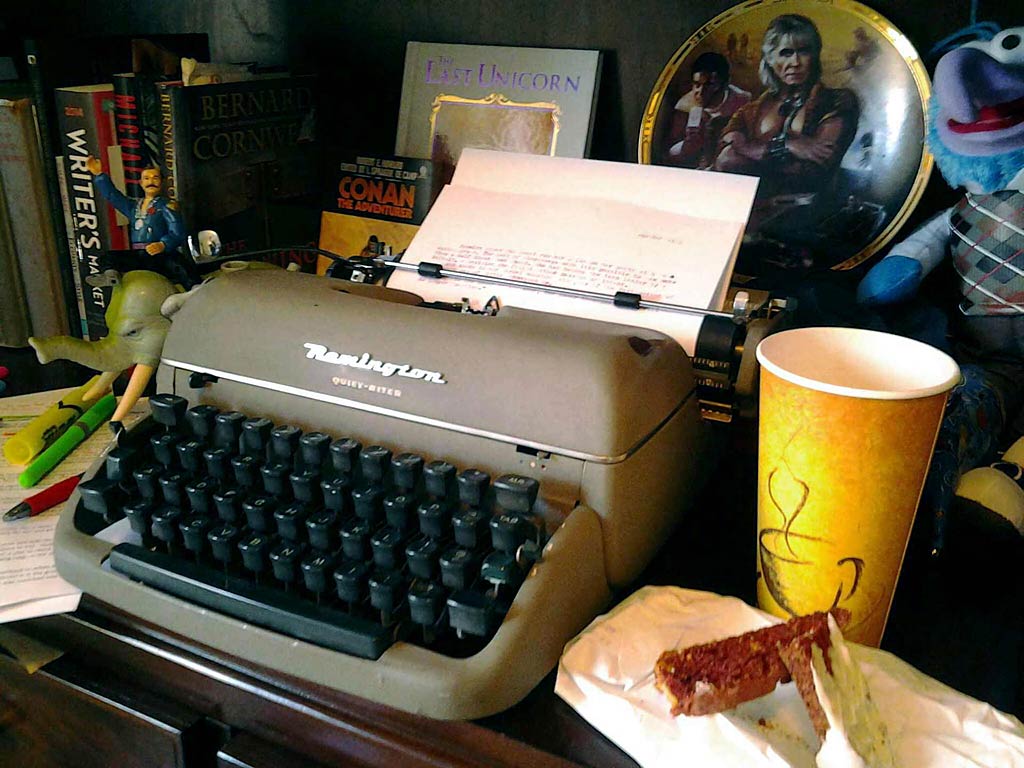Your buddy is an artist… a painter.
He works for weeks on his latest creation, a painting of a forest. He’s been talking about it non-stop. He’s overflowing with pride for the piece.
It’s got little bushes, bunnies, tall trees, and dapple sunlight cutting through a heavy tree canopy. It looks pretty good!
On the 9th week, you’re playing video games in his studio, while he’s messing with the painting. He looks at it a long while, shakes his head and expresses his disappointment.
He’s got to fix it.
So he gets paintin’ on it and by the time you finish your last mission, the forest scene has now become a cityscape.
Wet streets, hazy traffic lights, and endless rusty fire escapes.
That’s right, he completely 180’ed the painting. The forest is gone. Not a single bunny left on the canvas.
That’s a REWRITE. Content that becomes drastically different or nearly all the content is changed to some degree.
If he had only swapped out the bunnies for a family of deer…
If he had only added more pine trees instead of birch trees…
Those would have been EDITS. While edits can be extensive, without technically being a rewrite, edits normally don’t look to drastically change the content. Instead, edits look to tweak and refine the content that’s present. Also, edits typically focus on specific areas, leaving much of the content untouched.
Newer writers tend to REWRITE instead of EDIT. It’s a bad habit. One as an editor I find it super frustrating.
Unless you’re a professional writer, who specializes in rewrites, rewrites almost always set the writer back to square 1.
Think about it.
You wrote an original piece, it had some serious problems, so you scrapped the whole thing and wrote something new. If your first work had problems, what makes you think a new second work WON’T have problems?
If your original idea has merit, your goal should always be to fix whatever’s blocking it from reaching its full potential. Not starting over from scratch.
Here’s the main reason why writers hacking with a rewriting chainsaw are frustrating compared to the writer who works with editing finesse.
A while back I was helping a client with their sci-fi story and they had this great opening. Fast paced, full of action, with an excellent ending hook. It worked on every level and needed very little to maximize it’s effectiveness.
When I brought up some other problems later in the script, the writer went back to revise and in the second version of the script… the great opening scene was gone.
Completely vanished.
Replaced with a, “meh” opening scene.
They CHOPPED AND HACKED at a script than only needed some intricate fillet work.
Don’t get me wrong, there’s nothing wrong with rewriting.
In fact, in writing, the old saying is absolutely true,
“Writing is rewriting.”
But rewriting is demolition.
You only blow up the hotel when there’s no saving it. If some new interior decorating, a new pool, and a new kitchen will put the hotel on the A-list for years to come. Put the dynamite away.
Even though I’m an editor and story consultant, I don’t like to see people waste money.
That’s the other frustrating thing I hate to see when writers rewrite instead of edit: They’re just spending more money.
If it takes you 3 rounds with an editor to get your script in good shape, BUT you go and rewrite the thing 3 times, guess what… you just DOUBLED your editing cost.
For these reasons, you often see me encouraging folks to spend MORE TIME in story discovery. To plan and plot for as long as it takes to really make the outline sing. This is the anti-vomit draft approach.
Dangers Of The Vomit Draft
Many folks advocate for the vomit draft.
A first draft who’s only real goal is to get the material out onto the page so it can be refined.
If you have trouble procrastinating, the vomit draft can be useful… but for everybody else, or at least myself, I’m not much of a fan.
Vomit drafts always need heavy editing, but usually, require at least one rewrite.
Money issues aside. Strictly on a personal level, I prefer spending more time at the beginning before I write the script and less time fixing things after the script is written. There are always things to fix once a script is written, but when you’re working on a real mess (vomit draft) of a script, you can get stuck fixing things… for ever. ▪
About the Author —
If you enjoy this article, please share the direct link on your social media.
Newcomer or veteran writer, if you’re working on a project that needs commercial success, Nick urges to you read this intro article.
Nick Macari is a full-time freelance story consultant, developmental editor and writer, working primarily in the independent gaming and comic markets. His first published comic appeared on shelves via Diamond in the late 90’s. Today you can find his comic work on comixology, Amazon, and in select stores around the U.S.
